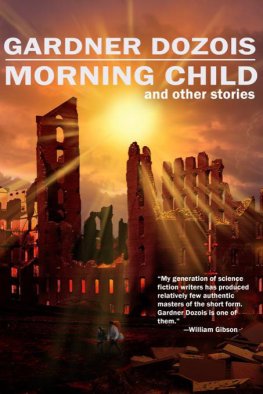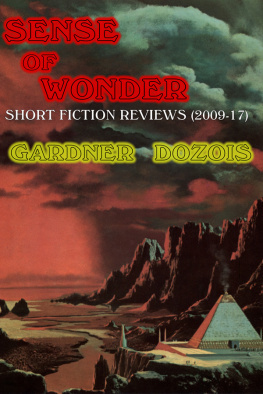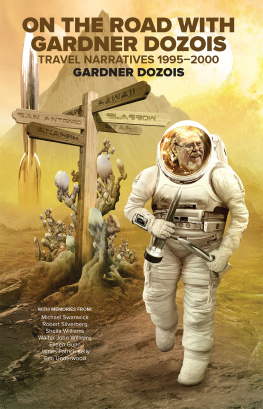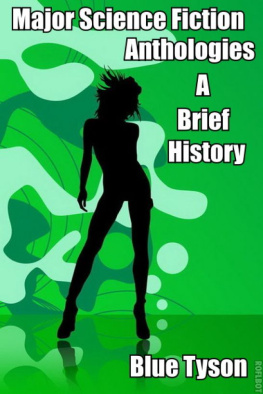Gardner Dozois - The Years Best Science Fiction, Vol. 20
Here you can read online Gardner Dozois - The Years Best Science Fiction, Vol. 20 full text of the book (entire story) in english for free. Download pdf and epub, get meaning, cover and reviews about this ebook. genre: Science fiction. Description of the work, (preface) as well as reviews are available. Best literature library LitArk.com created for fans of good reading and offers a wide selection of genres:
Romance novel
Science fiction
Adventure
Detective
Science
History
Home and family
Prose
Art
Politics
Computer
Non-fiction
Religion
Business
Children
Humor
Choose a favorite category and find really read worthwhile books. Enjoy immersion in the world of imagination, feel the emotions of the characters or learn something new for yourself, make an fascinating discovery.
- Book:The Years Best Science Fiction, Vol. 20
- Author:
- Genre:
- Rating:3 / 5
- Favourites:Add to favourites
- Your mark:
- 60
- 1
- 2
- 3
- 4
- 5
The Years Best Science Fiction, Vol. 20: summary, description and annotation
We offer to read an annotation, description, summary or preface (depends on what the author of the book "The Years Best Science Fiction, Vol. 20" wrote himself). If you haven't found the necessary information about the book — write in the comments, we will try to find it.
The Years Best Science Fiction, Vol. 20 — read online for free the complete book (whole text) full work
Below is the text of the book, divided by pages. System saving the place of the last page read, allows you to conveniently read the book "The Years Best Science Fiction, Vol. 20" online for free, without having to search again every time where you left off. Put a bookmark, and you can go to the page where you finished reading at any time.
Font size:
Interval:
Bookmark:
Gardner Dozois, Editor
The Years Best Science Fiction, Vol. 20
THE YEARS BEST SCIENCE FICTION TWENTIETH ANNUAL COLLECTION. Copyright 2003 by Gardner Dozois. All rights reserved. Printed in the United States of America. No part of this book may be used or reproduced in any manner whatsoever without written permission except in the case of brief quotations embodied in critical articles or reviews. For information, address St. Martins Press, 175 Fifth Avenue, New York, N.Y. 10010.
0-312-30860-4 (tp)
FIRST EDITION: JULY 2003
AcknowledgmentsAcknowledgments
The editor would like to thank the following people for their help and support: Susan Casper, Ellen Datlow, Gordon Van Gelder, Peter Crowther, David Pringle, Eileen Gunn, Nisi Shawl, Mark Watson, Sheila Williams, Brian Bieniowski, Trevor Quachri, Paul Frazier, Mark R. Kelly, Mark Watson, Gary Turner, Marty Halpern, Jayme Lynn Blaschke, Byron R. Tetrick, Richard Freeborn, Robert Silverberg, Cory Doctorow, Michael Swanwick, Charles Stross, Craig Engler, Linn Prentis, Vaughne Lee Hansen, Jed Hartman, Mary Anne Mohanraj, Susan Marie Groppi, Patrick Swenson, Tom Vander Neut, Andy Cox, Steve Pendergrast, Laura Ann Gilman, Alastair Reynolds, Warren Lapine, Shawna McCarthy, David Hartwell, Darrell Schweitzer, Robert Sawyer, Jennifer A. Hall, and special thanks to my own editor, Marc Resnick.
Thanks are also due to Charles N. Brown, whose magazine Locus [Locus Publications, P.O. Box 13305, Oakland, CA 94661, $49 for a one-year subscription (twelve issues) via second class; credit card orders (510) 339-9198] was used as an invaluable reference source throughout the Summation; Locus Online (www.locusmag.com), edited by Mark Kelly, has also become a key reference source. Thanks are also due to the editors of Science Fiction Chronicle (DNA Publications, Inc., P.O. Box 2988, Radford, VA 24143-2988, $45 for a one-year/ twelve-issue subscription via second class) was also used as a reference source throughout.
Introduction - Summation: 2002
Although critics continued to talk about the Death of Science Fiction throughout 2002 (some of them with ill-disguised longing), the unpalatable fact (for them) is that science fiction didnt die this year, and doesnt even look particularly sick. In fact, sales for many genre titles were brisk, and not only were there not fewer books published this year than last, several new book lines were added that swelled the total and are going to swell it more next year (and this isnt even counting print-on-demand titles and books sold as electronic downloads from internet Web sites, things much more difficult to keep track of than traditionally printed-and-distributed books). Nor, to my eyes anyway, was there any noticeable fall-off in literary quality. Sure, theres plenty of crap out there on the bookstore shelves, just as theres always been. But theres also more quality SF of many different flavors and varieties (to say nothing of the equally diverse range of quality fantasy titles) available out there this year than any one person is going to be able to read, unless they make a full-time job out of doing so (even the professional reviewers have difficulty keeping up!). In fact, an incredibly wide spectrum of good SF and fantasy, both new titles and formerly long-out-of-print older books, are probably more readily available to the average reader now-in many different forms and formats-than at any other time in history. All of which indicate to me that nailing the coffin-lid shut on the genre, smearing ashes on your face, and trotting out the obituaries might be just a bit premature.
In fact, 2002 was a rather quiet year in the genre market. There were few major changes this year. The slowing economy has yet to hit the genre too hard (knock on wood), although there are signs of possible trouble ahead for conglomerates, such as AOL-Time Warner and Bertelsmann; the difficulties are on high corporate levels and not directly caused by anything happening on the genre level, although they may eventually impact it. There were even some signs of expansion: Five Star Books added a vigorous new SF line, with the emphasis on short-story collections edited by Martin H. Greenberg; Tor added a new Young Adult science fiction and fantasy line, Starscape, and by early in 2003 had added a second YA mass-market line, Tor Teen; Tor is also planning to start a paranormal romance line, as yet unnamed, in 2004; Penguin Putnam started a new line of science fiction and fantasy books, Firebird, aimed at young readers; Del Rey introduced a new YA line, Imagine; and HarperCollins started Childrens and YA Eos in the beginning of 2003.
Although all of this sudden interest in producing books for young adults is, of course, attributable to the immense success of the Harry Potter novels, it pleases me to see it, especially in science fiction, since novels aimed at the young adult market more-or-less ceased to exist (or at least became very thin on the ground) after the high days of the Andre Norton and Robert A. Heinlein juvenile novels of the 50s and 60s. This was short-sighted of science fiction publishers; I think that one reason why fantasy may have had an edge in popularity over science fiction in the last few decades is that fantasy has continued its tradition of easily findable, high-quality YA work-giving young readers somewhere to start, somewhere to become hooked on the form, before they eventually move up to reading more challenging adult-level work-while SF largely abandoned that whole share of the audience. Ironically, the much despised media novels, such as Star Trek and Star Wars books, may have been one of the few things left to play this role to a limited extent for potential new SF readers during the last twenty years, a service that theyve hardly received any credit for from critics. Good new non-media-specific YA SF would, I think, do an even better job of funneling young new readers directly into the core of the genre, and, with luck, some of those readers might stick around when they get older. The operative word here, though, is good. Most of the deliberate attempts to create YA SF novels in the past few years have produced only dull, pompous, and condescending books, usually stuffed to the gunwales with didactic libertarian propaganda. This isnt going to do it for kids raised on MTV, CGI-drenched movies, and computer games. You need something that will be as exciting to kids in the Oughts as Heinleins juvenile novels were to kids in the 50s. And, frankly, rather than being as safe and politically correct as possible, a whiff of nonconformist rebellion and outlaw danger wouldnt hurt either. So lets hope that these new YA lines will help. If SF as a genre can find stuff that kids are actually eager to read, rather than having it prescribed for them medicinally, then that will go a long way to assuring that there are people around who still want to read the stuff even in the middle decades of the new century ahead.
2002 was another tough year in the magazine market, but at least the overall losses in circulation were relatively small as opposed to the huge plunges weve seen in other years, and there were small gains to partially balance off the losses-although these varied from magazine to magazine, so that Asimovs Science Fiction gained in subscriptions but lost in newsstand sales, while The Magazine of Fantasy and Science Fiction lost subscriptions but gained in newsstand sales, and so forth.
Last year I went into great detail explaining the publishing factors that were battering the whole magazine industry, regardless of genre, far beyond the boundaries of the science fiction field, including former mega-sellers such as Playboy and TV Guide, and some of the technical reasons why things might not be quite as bad in the SF magazine world as they appeared to be-and, as Id feared going in, it was largely a waste of time, as I still spent the rest of the year fielding questions in interviews and convention panels about the Death of Science Fiction as indicated by declining magazine circulation and listening to remarks about how the editors must be buying the wrong kinds of stories or the circulations wouldnt be going down. I cant summon the strength to go through all that again (read the Summation for The Years Best Science Fiction, Nineteenth Annual Collection, if youd like to see the arguments). So Ill settle for mentioning that while its tough to put too positive a spin on the situation in the current SF magazine market, and, of course, no magazine editor is happy to see his overall circulation decline, one factor that is often overlooked is that while circulation decreased by small amounts at most magazines this year, sell-through, the number of magazines that must be put out in the marketplace to sell one, has increased, increased dramatically in some cases-at Asimovs, sell-through was up to a record 56% last year; at Analog, sell-through was up to a record 55%; and at The Magazine of Fantasy and Science Fiction, sell-through was up to 37%. This is a factor that goes straight to the profitability of a magazine. To achieve a 35% sell-through, for instance, means that three times as many magazines are printed and put on the newsstands as actually sell: if you can cut-back on the number of unsold copies you have to put out there in order to actually sell one, your sell-through increases, and you save a lot of money in production costs by not having to print and distribute as many extra copies that no one is going to buy. This is one of the hidden factors, along with how cheap digest-sized magazines are to produce in the first place, that is, so far anyway, helping to keep the SF magazine market afloat.
Font size:
Interval:
Bookmark:
Similar books «The Years Best Science Fiction, Vol. 20»
Look at similar books to The Years Best Science Fiction, Vol. 20. We have selected literature similar in name and meaning in the hope of providing readers with more options to find new, interesting, not yet read works.
Discussion, reviews of the book The Years Best Science Fiction, Vol. 20 and just readers' own opinions. Leave your comments, write what you think about the work, its meaning or the main characters. Specify what exactly you liked and what you didn't like, and why you think so.











